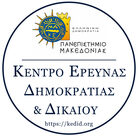Νικόλαος Ζαχαριάδης[1], Θεοφάνης Εξαδάκτυλος[2], Jörgen Sparf[3], Ευαγγελία Πετρίδου[4], Αλέξανδρος Κυριακίδης[5], Ιωάννης Παπαδόπουλος[6]
In this article, we statistically examine the effectiveness of non-pharmaceutical interventions (NPIs) implemented by the national governments of Greece and Cyprus during 2020 to (a) limit the spread of the SARS-CoV-2 virus, and (b) mitigate the economic fallout brought about by the Covid-19 pandemic. Applying a modified health belief model, we hypothesize that behavioral outcomes at the policy level are a function of NPIs, perceived severity, and social context. We employ a Prais-Winsten estimation in 2-week averages and report panel-corrected standard errors to find that NPIs have clear, yet differential, effects on public health and the economy in terms of statistical significance and time lags. The study provides a critical framework to inform future interventions during emerging pandemics.
[1] Καθηγητής Τμήματος Διεθνών Σπουδών και κάτοχος της Έδρας Mertie Buckman Πανεπιστημίου Rhodes (Μέμφις, ΗΠΑ).
[2] Καθηγητής Τμήματος Πολιτικών Επιστημών Πανεπιστημίου Surrey (ΗΒ).
[3] Αναπληρωτής Καθηγητής Πανεπιστημίου Trondheim (Νορβηγία).
[4] Αναπληρώτρια Καθηγήτρια Πανεπιστημίου Trondheim (Νορβηγία).
[5] Μεταδιδακτορικός Ερευνητής Πανεπιστημίου Μακεδονίας.
[6] Αναπληρωτής Καθηγητής Πανεπιστημίου Μακεδονίας.
